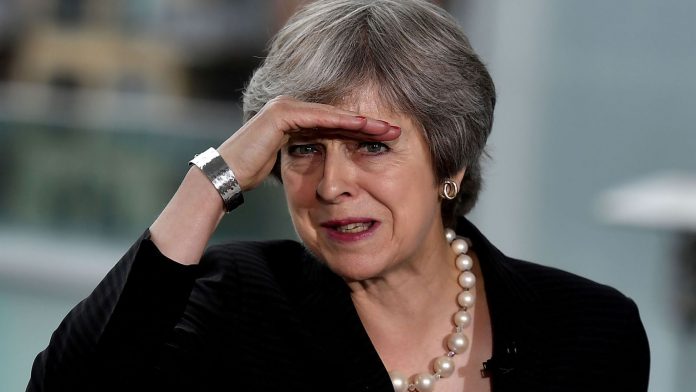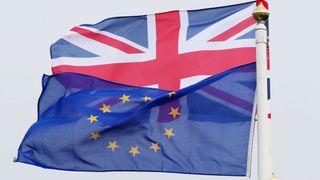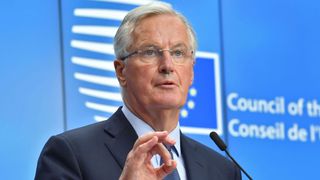[ad_1]
The phony war is over.
After two years of near-stasis, the last fortnight must be considered the most important period of the Brexit process since the referendum itself and last year’s shock general election result.
It feels, at last, like the contours of the Brexit process, its endgame, have been revealed for what they really are.
And for the first time, after last week’s parliamentary contortions, both sides now believe that no deal is a real possibility.
In the past, Theresa May often said that no deal was better than a bad deal, but she didn’t mean it.
It was a negotiating ploy.
But not for the first time, idle words and brinkmanship with Brussels have come back to haunt a Tory prime minister.
Theresa May has spent two years as prime minister as David Cameron spent six – trying, often in vain, to keep the Tory party together over Europe.
Her strategy is much the same as Cameron’s: to appease the carnivorous Brexiteer right by throwing them fresh, Eurosceptic red meat at regular intervals.
So Cameron vetoed the EU budget in 2011, he tried to veto Jean-Claude Juncker as commission president, he pulled the Conservatives out of the pro-EU European People’s Party Group in the European Parliament and so on and so forth.
Again and again he chose not to confront them, for fear his position was too weak, until the very end, when the referendum came and by then it was too late.
In delaying the battle, he made the war worse.
Every time he went on TV to disparage Europe, every time he vetoed something, or lambasted this EU initiative or that, he bought himself a few positive headlines, a few glowing Brexiteer smiles, but their appetite was undiminished, they would come back for more, smile gone, hungrier than ever.
Moreover, this wasn’t an internal conversation – the public was listening too.
To the very end he kept his options open, ducking and diving – even suggesting in the weeks leading up to the announcement of the referendum, that if his negotiations with Europe were unsuccessful he might lead the Leave campaign.
This was absurd – but it was only the last example of his storing up credibility problems.
During the referendum, when Cameron claimed that disaster would come if we voted to leave, the voters were rightly puzzled: if so, they said, why are you even asking us in the first place?
Why risk a referendum? And why did you say you might lead the Leave side only a few months ago?
And while we’re at it, if Europe is so great, why have you been eviscerating it for the last 10 years while you’ve been Tory leader?
Cameron’s political dexterity and agility, for so long an asset, had become a profound liability.
And history has repeated itself.
Theresa May, so determined for so long to keep her party together, has waited for too long to reveal her hand.
In the meantime, others have filled the vacuum with their own hopes and dreams – her Brexiteers believing she was now one of them and when her proposals for a deal came, they would not disappoint.
How aghast they were. As Arthur Miller said: “Betrayal is the only truth which sticks.”
Justified or not, betrayal is the word on the Brexiteers’ lips – in parliament and country alike.
Perhaps this was inevitable but Mrs May made it worse.
In saying “no deal is better than a bad deal” she helped convince the public that no deal wouldn’t be so bad.
She said it again and again and again and so she ought not to be surprised to learn that the voters believed her.
In saying “Brexit means Brexit” she helped set impossibly high standards for what Brexit might mean.
She could never meet them.
No surprise then, that only 11% of the public back Chequers and 38% think we must come out with no deal at all.
Like Cameron, she finds her own words and actions haunting her.
In both cases, the political breathing space they bought in the short-term suffocates them in the end.
Over the summer, she must do her best to sell her proposals which in fact fall a long way from the soft Brexit many Remainers would like.
But as Cameron found, selling his “renegotiation”, the stories prime ministers tell about themselves and their motives, built over years, are hard to escape.
Nick Clegg said that his former coalition ally Mr Cameron was “all tactics, no strategy” when it came to Europe.
Theresa May runs the risk of historians saying much the same about her.
Since taking office, her cardinal objectives have been 1/ to prevent a Tory party split, 2/ to minimise economic damage, and 3/ to prevent a betrayal narrative infecting our politics.
The tragedy of the Theresa May premiership might yet be that we get all three.
[ad_2]











